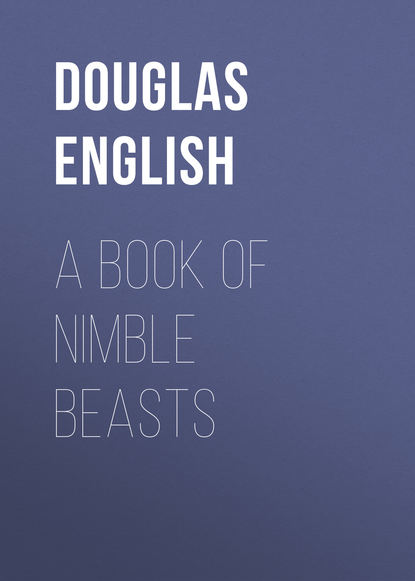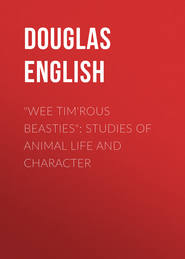По всем вопросам обращайтесь на: info@litportal.ru
(©) 2003-2024.
✖
A Book of Nimble Beasts
Настройки чтения
Размер шрифта
Высота строк
Поля
The Shrew-mouse cut him short.
"The King Toad has heard your singing," she said, "and has commanded your presence. The Natterjack will guide you."
Ambition strove with gallantry, and, for a time, the French Frog wavered.
"And have I your permission, Shrew-mouse?" he said, at last.
"Please go," said she, "then come and tell me all about it." So both departed. The Shrew-mouse watched them out of sight, then swam to open water. She wished the Rat to see her next.
*****
"Sire," said the Natterjack, "it is my privilege to inform you that I have been successful."
The King Toad made no answer. His eyes turned from the Natterjack to his companion, and, after an appropriate pause, he signed with one fore-foot.
The French Frog tiptoed forward.
"I have heard your singing," said the King Toad, "and your singing has annoyed me intensely."
There was a queer strained silence.
The Natterjack turned to conceal his face, and saw the Green Toad perched above him. He too was struggling to keep countenance. Beside him was the Salamander, wreathed in smiles.
The Green Toad, too, was Struggling to keep Countenance
"Your singing has annoyed me intensely," repeated the King Toad.
Words failed the French Frog, who could only gulp.
"Sire," he burst out at length, "it was a love-song."
"A love-song!" said the King Toad, "a love-song! and what nice-minded English frog would listen to your love-song?"
His Inside was Red-Hot
The French Frog might have scored a point, but prudence checked him.
"I am a poor exile, Sire," he said, "and, when I sing, my heart is far away."
"So will your voice be, soon," said the King affably. "Come out, fire-toads." The fire-toads squirmed from underneath him.
The French Frog eyed them greedily. There are worse eatables than little toads.
"You may have the big one," said the King.
"Sire!" screamed Bombinatrix.
But she was too late. The French Frog's mouth had closed again, and all now visible of Bombinator was one distraught hind leg.
He Lay as He had Fallen on His Back
"Excellent," murmured the King Toad, and watched the French Frog narrowly. He was worth watching. He paled a dirty ochre, his eyes rolled horribly, he scratched his sides with both hind feet, he dragged at his own throat, he gasped and foamed and spluttered.
"Most interesting," said the King.
But there was more to follow. The French Frog straddled with his toes wide spread; then came an uncontrollable explosion, which flung him four feet skywards, and, at the height of this great leap, loosed Bombinator.
Two thuds were heard, the first a sounding, floppy one, the second farther off and duller.
"I thought that would happen," said the King Toad.
The French Frog slowly pulled himself together, climbed up the slope, and sat with mouth agape. His inside was red-hot.
The Natterjack burst into song, the Green Toad joined him, the Salamander laughed outright, but Bombinatrix, with a heavy heart, hopped silently away.
She was not long in finding him. He lay, as he had fallen, on his back, his hands and feet outspread, his poor throat twitching. But he still breathed, breathed in short, wheezy, gasping sobs, which made his whole frame shudder.
She crept up close and whispered. I cannot tell you what she said, but Bombinator caught the sense of it. He stretched his legs as far as they would go, and clasped his hands beneath his chin. This seemed to ease his breathing, and presently, from every pore, welled a bead-drop of moisture. He lay thus for an hour, and Bombinatrix mounted guard beside him.
At last he moved, but Bombinatrix checked him instantly. "Down, Toad of mine," she whispered, "down for your dear life!"
"What is it now?" he groaned.
"Ducks," whispered Bombinatrix, "Great, Fat, White Ducks!"
"Ducks," whispered Bombinatrix, "Great, Fat, White Ducks"
ANIMALS' NESTS
(MARCH)
WHEN a young friend of mine told me the other day that he was going birds'-nesting, and I told him in reply that I was going animal-nesting, I think that, if he had not been a very polite young friend, he would have laughed at me. As it was he laughed with me—which was really very nice of him, for he must have been thinking all the time that I was laughing at him. But I was quite serious really. I was going animal-nesting. I hear you ask at once, "What animal was it?" and I might tease you by saying, "Any animal, of course. When you go birds'-nesting you look for any kind of bird's nest you can find, and when I go animal-nesting, I look for any kind of animal's nest I can find." But I won't do that, because there are only a few animals' nests which can be found in the same way in which you find birds' nests. All animals make some kind of nest for their babies, and most of them make some kind of nest to sleep in too. They make them in such queer, out-of-the-way places, though, that it would be quite impossible for any boy or girl, let alone a man or woman, to find them; for the first thing to be done would be to choose the right hole in the ground, and the next thing to be done would be to crawl down it. Some animals, however, make nests which are not in burrows, and though these are not nearly so easy to find as birds' nests, they can be found if you know the sort of place to look for them in.
There are four animals in this country whose nests can be found without having to dig, and these are the mole, the squirrel, the dormouse, and the harvest-mouse. Three of these build their nests above the ground, and the fourth, "the little gentleman in black velvet," builds the ground above his nest. I am going to tell you something about this one (the mole) first, because his nest, I think, is the easiest to see. I expect most of you know those queer little heaps of earth which are sometimes dotted about the fields and are called mole-hills (I want you to keep these in your minds for the moment), and I expect those of you who have got a natural history book will have seen a picture of what is called a mole fortress. I want you to put that out of your mind altogether; it is quite wrong. Now, the little mole-hills never have a nest in them, and I am not quite sure why the moles make so many, but if you ever find a really big hill among the little ones, as big as six or seven of these heaped together, and grub down into it (it is quite soft, and you can do this with your hands if you don't mind getting dirty), you will find a mole's nest just about the place where you would find the grass growing if there was no hill at all. In May or June you may find the baby moles. Have a good look at them and put them back, for you won't be able to keep them alive, and the mother mole is sure to come back and look after them—when you have gone.
FOUR MOLES' NESTS TOGETHER. THE BIG HILLOCK OF EARTH ABOVE THEM HAS ALL BEEN TAKEN AWAY SO THAT THEY COULD BE PHOTOGRAPHED
Another animal's nest which is easy to find is the squirrel's, but of course it is no use looking for this anywhere but in woods and places of that kind where you know there are squirrels about. A squirrel's nest is in a hole, or fork of a tree, and always, always out of reach. When it is in a fork of a tree it looks like an untidy bird's-nest, made of rather big twigs. It has a soft, warm lining, though, and, if you can get up to it, you may find the baby squirrels inside in June. If they are furry you can take them away, for then they are quite easy to bring up and tame.
The Squirrel. "Squirrel means Shadowtail"
Then there is the harvest-mouse's nest, which is the most beautifully made of all, and is usually to be found in cornfields, built some way up the stalks, and looking just like a bird's-nest except that it is quite round and has no opening that you can see. One can't very well walk about in a cornfield, but you have another chance of finding a harvest-mouse's nest in the hay-time, for they often build in the hay, and once I found one with babies in it, on a haycock, where it had been thrown without any one noticing it.
THE HARVEST MOUSE'S NEST
The most beautifully made of all
You have two chances, too, of finding a dormouse's nest, for this mouse builds one nest for the babies, and another to sleep in through the winter. Both of them are rather big compared with the harvest-mouse's nest, and they are generally made of moss and leaves, often honeysuckle leaves, which the mother dormouse seems to like, though I can't tell you why.






